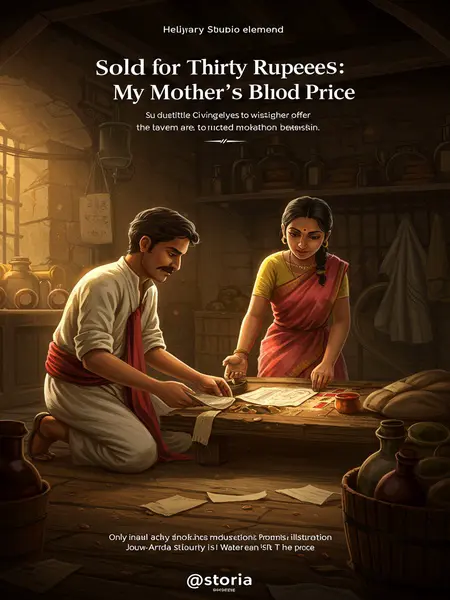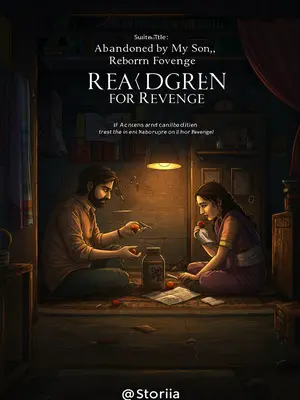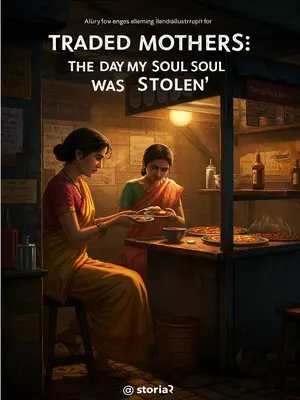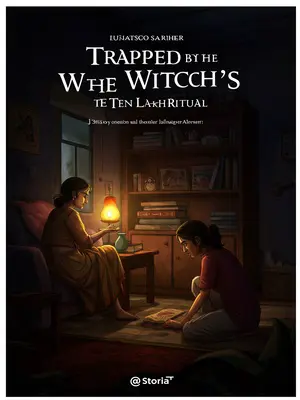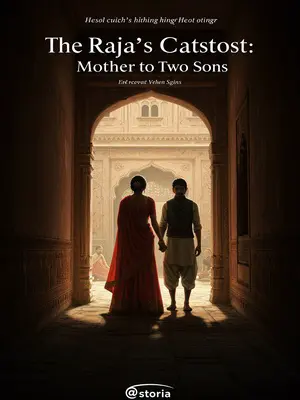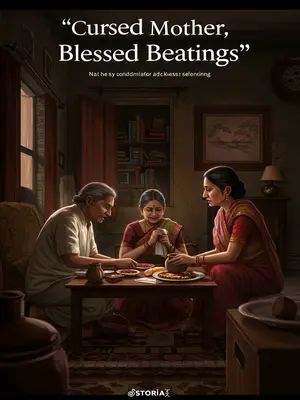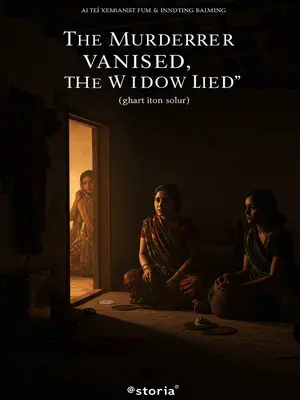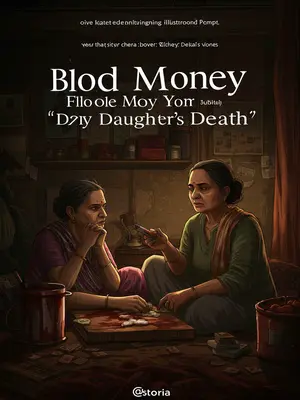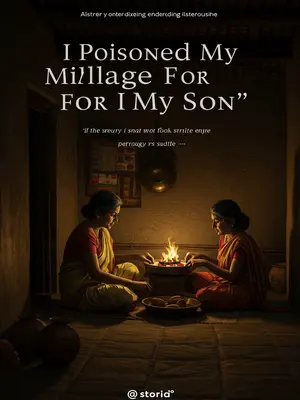Chapter 2: Lost Names, Stolen Childhoods
At last, near Kolkata, Amit and his brother met their new fate.
The air reeked of river mud and frying fish. Rickshaws rattled past, and even the crows sounded different. Amit tried to memorise every detail, just in case.
They were first taken to Ashok babu’s house—a man with yellowed teeth and a quick temper, whose wife muttered about "pet bharne ka bojh" as she eyed the new arrivals.
The place teemed with children, most younger than Amit. Some were babies, others barely school-age. They huddled together, shrinking from the adults’ gaze. Amit scanned their faces, searching for a glimmer of hope.
Ashok’s house was like a ration shop, shelves lined with all kinds of goods—except these goods were lost children.
At night, the room overflowed with restless bodies, barely space to stretch. Thin mats on the floor, children clutching each other for comfort.
Whenever a stranger came, the children were lined up, waiting to be chosen—like cattle at market. They learned to keep their heads down, eyes on the floor.
Amit and Kunal stood among them, silent and trembling.
In the end, seven-year-old Amit, because he remembered everything, was sold cheaply to a local buyer named Mr. Das.
Their eyes met for a second. "Yeh bacha zyada nahi bolta, le lo saste mein," Ashok said, as if haggling over onions, not a life.
Amit was given a new name: Arjun Das.
Amit. Arjun. He mouthed both, afraid to let go of either. The new name tasted like stolen food—unfamiliar, but forced upon him.
Where his brother was sold, Amit never found out.
The day Kunal was taken, Amit screamed till his voice cracked, but the adults only laughed. Their last memory was a desperate, tearful goodbye on the stairs.
Being trafficked was like being reborn in darkness.
His old self died in that basement, replaced by a hollow-eyed boy who answered to any name given.
Some children were lucky enough to be raised by families who truly wanted them. But that was rare—most, like Amit, were just tools to carry on a family’s name.
An older boy whispered once, "Agar kismet achhi hai toh naya maa-baap milte hain. Nahi toh sab kaam karna padta hai." Thin hope, but it was all they had.
If you were a girl, you would bear children, continue the family. If a boy, you worked and earned, carrying the family name.
Amit understood: work, obey, never shame the family. Bitterness made it clear.
Just like that, Amit became a Das.
The house reeked of old rice and musty walls. He took off his slippers at the threshold, like the other children.
He was greeted by two thin girls, hair in messy plaits—one with a cracked doll, the other staring at him with suspicion. No one smiled.
Amit glanced around: the courtyard wall was broken, a chicken shed in the corner, the kitchen black with soot. The kitchen always smelled of burnt mustard oil. The girls squabbled over a single boiled potato. Amit’s heart ached for home.
That night, curled on a rough mat, he whispered his mother’s name into the dark, pressing his fist to his lips to stop from crying.
Soon after, Amit was forced to do farm work: lighting the chulha, tending chickens, caring for the girls.
He woke at dawn, swept the yard, fed the chickens, carried water from the well, put the girls to bed with stories.
But if he made a mistake—spilled rice, burnt daal—Shyamal Das’s temper flared. The beatings came without warning. Amit learned to flinch at sudden movements.
Food was always scarce. Sometimes only a stale roti and salt for breakfast. He dreamt of his mother’s food, the warm milk at bedtime. Now, hunger was his only companion.
At night, the kitchen was locked. Even if a child cried from hunger, no one listened.
Once, desperate, Amit pried out a few bricks, hoping to kill a chicken for a secret feast. He coaxed a hen near the gap, but the bird squawked, giving him away.
Shyamal Das stormed in, stick raised. “Kaminey, sab barbaad kar diya!” He grabbed Amit and struck him across the waist. Amit curled into a ball, hands over his head, the way he’d seen stray dogs do when the chowkidar chased them.
“With this, you’ll be tied to this family for life,” Shyamal Das declared, voice cold. “Ab yahi tera ghar hai, samjha?”
But Amit was already seven when bought—he remembered everything. The memory of his mother’s murder was a shield. He whispered his real name every night, refusing to forget.
He made a silent vow: "Jab tak zinda hoon, waapas jaoonga."
A year later, Amit started school with the other children.
The building was old, blue and white, classrooms smelling of chalk and sweat. His registered name was Arjun Das. Every time the teacher called "Arjun," Amit’s heart twisted. He scribbled his real name in his notebook’s margins, erasing it quickly if anyone came near.
Amit gradually learned about the village—chaiwala who winked at kids, postman on his cycle, whispers at the well about children bought from elsewhere.
Could Kunal be among them?
At every festival, every wedding, Amit scanned the crowd for his brother’s face. After each failed search, he drew Kunal’s face from memory, then erased it in frustration, afraid he was forgetting the details.
He asked older boys, listened at the sweet shop, "Kahi koi naya bacha aaya kya?" Once, a village child said in the neighbouring village there was a boy who looked just like him.
Hope flared. Amit barely slept, heart pounding. He ran to the next village, but the boy wasn’t Kunal. He walked home in the drizzle, kicking stones, wiping his eyes and blaming the rain.
Every night, he replayed the last memory of Kunal, the question gnawing: where had his brother gone?
Did Papa know what happened? Was he searching for them?
He dreamed of his father’s strong arms, but the dream always ended before he could be found.
Meanwhile, Ramesh Singh broke down, but never cried in front of the neighbours—just stared at the horizon, jaw clenched, daring fate to bring his boys back.
After his wife and sons vanished, he searched day and night, showing photos in the bazaar, begging for news.
Rumours spread: some said Meena ran away, others that she fought with Ramesh. Old women whispered, “Aaj kal ki auratein, kuch bhi kar sakti hain.”
But Ramesh refused to believe it. “Meena kabhi aisa nahi karegi!” he’d shout, smashing a clay pot. "Tees rupaye… bas tees? Woh toh bachchon ka doodh bhi nahi laati bina poore paise ke."
He spent his days at the police station, pleading, "Saab, kuch pata chala?" The answer was always a tired shrug.
One night at a wedding, a cousin whispered, “Why not follow the human trafficker lead?” The words stuck like a thorn.
Kaveripur knew of trafficking—two or three traffickers had even been jailed. Ramesh clung to this hope.
He made lists, visited every stall, even tried to bribe a constable with homemade pickles. His stubbornness became legend.
Soon, news of Meena and the boys’ disappearance spread. Mothers gripped their children tighter. Gauri Devi, famous for her sharp tongue and sharper memory, told police she’d seen Amit and Kunal outside a shop that day. Her bangles clinked as she spoke, voice sharp enough to cut through any lie.
She’d greeted the children, telling them to go home. “Arey Amit beta, Kunal, ghar jao jaldi. Bahar mat ghoomo.” Amit replied, “We have to wait for Mum to go together.”
That answer haunted Gauri Devi for years. “Woh bachche kitne shareef the…” she’d sigh.
Police and Ramesh searched the lane, but found nothing. Ramesh slumped in despair, only to remember Puran Lal—the man with the bad reputation and a house with a deep basement. His stomach turned cold, like the first rainwater on a hot stone.
He begged police to search, but without evidence, they only glanced around. Nothing was found.
After the police left, Ramesh and his family refused to give up. They tried to gather villagers for a search, bribing with Gold Flake cigarettes. But an elder warned, “Bina saboot ke ghusoge toh khud jail jaoge.” Without proof, they were stopped.
What they didn’t know was that Amit and Kunal were locked in the basement just metres away, praying for rescue.
Fate plays cruel tricks. The father searched, the sons waited, both missing each other by a whisker.
After Meena and the boys disappeared, Ramesh became a ghost of himself. The grey-haired Singh grandmother worried he’d harm himself, urging him to step outside. She died clutching a photo of her grandsons, her last words a plea for their return.
Ramesh left the old house eventually, scribbling on the wall, “Amit, Kunal, your father has gone to find you.”
That night, he sat alone in the empty house, a diya flickering by the door.
Time moved forward. The world changed, but some wounds never healed.
Near Kolkata, Amit grew into a teenager, caught between two names—Amit and Arjun—haunted by fading memories.
He struggled in school, but drawing was his only solace. He sketched his hometown, the Durga Puja pandals, his mother’s face, and the scene of her murder, over and over, afraid he’d forget.
After fifth standard, he dropped out, working on the farm and filling secret diaries with sketches and plans for revenge.
During Diwali 2000, he met villagers who returned from Mumbai as marble carvers. Seeing their prosperity, he begged Shyamal Das to let him learn. At first, Shyamal refused, but the promise of monthly earnings swayed him.
Amit packed his few belongings and boarded a train to Surat, whispering a quiet goodbye to the only home he’d known in years. But as the train picked up speed, Amit realised—this was the first step towards finding his real name.
